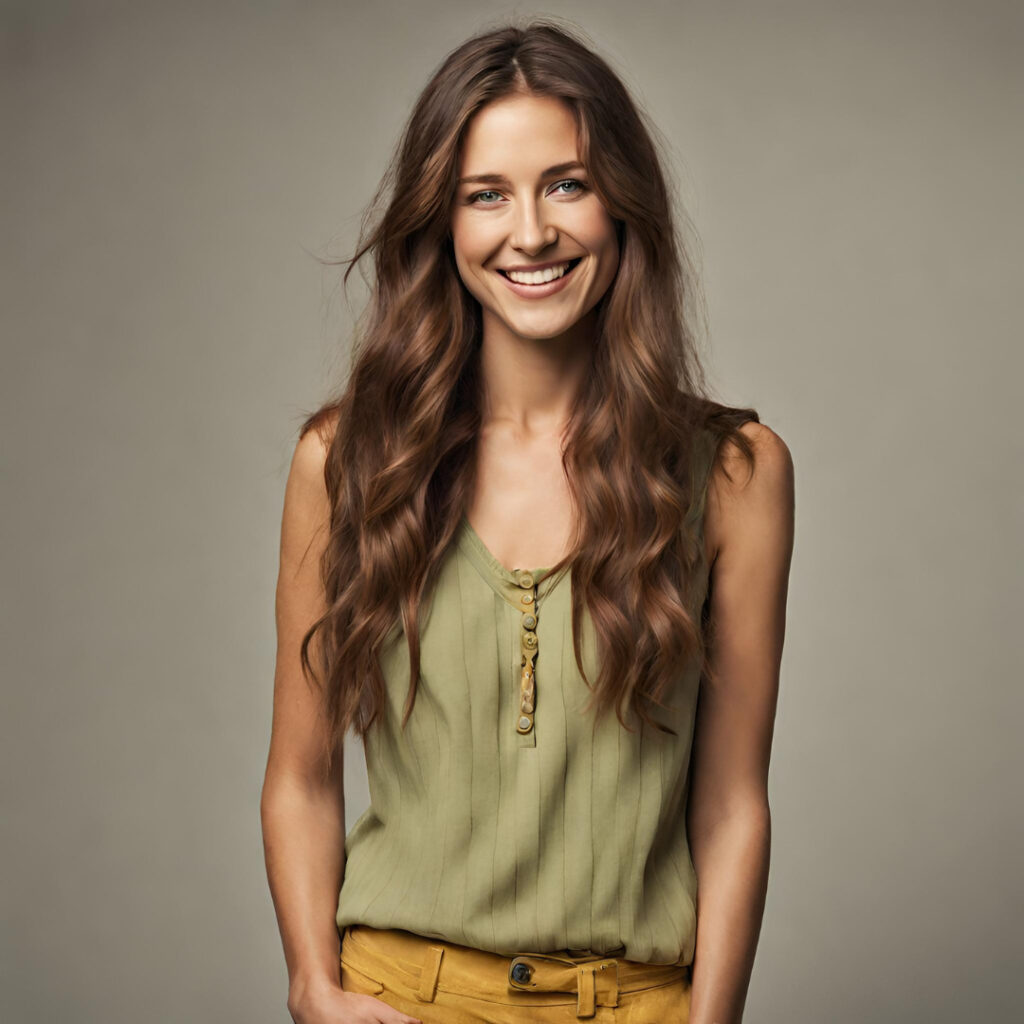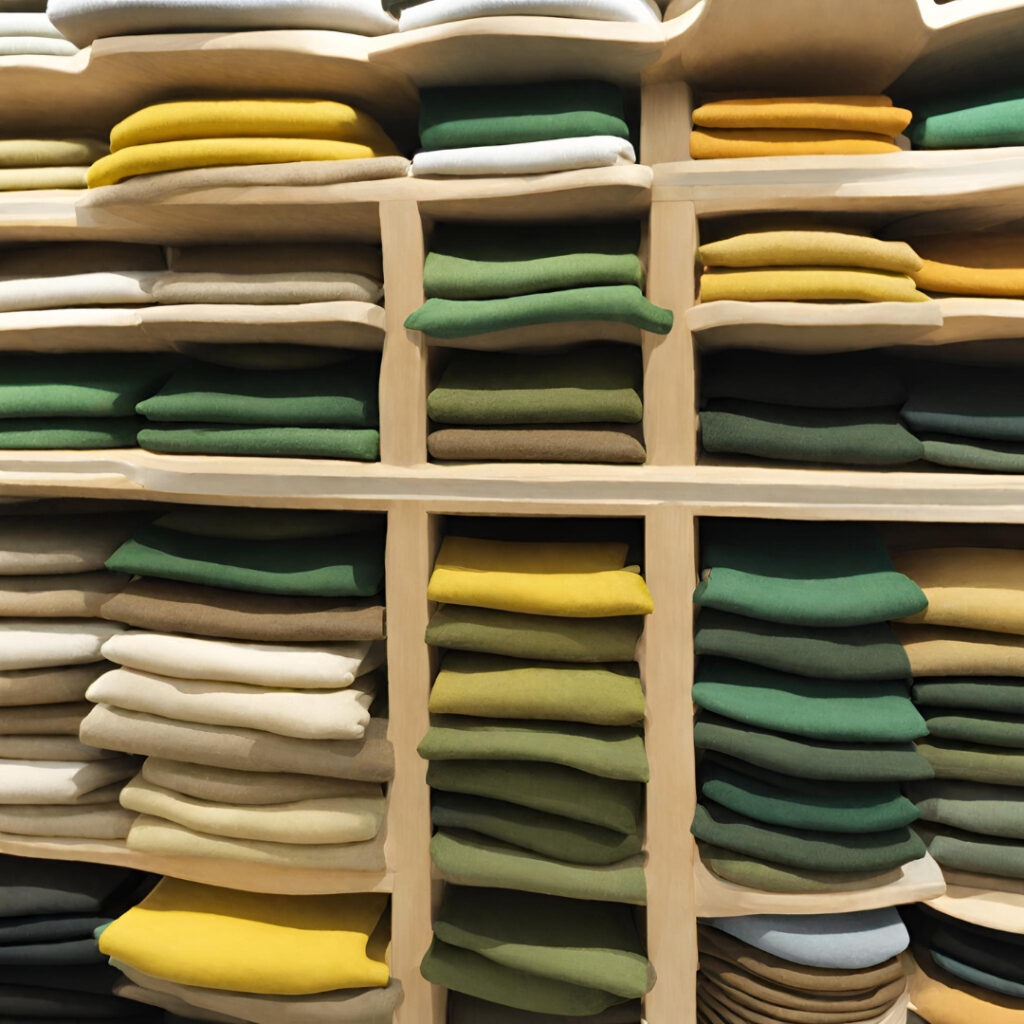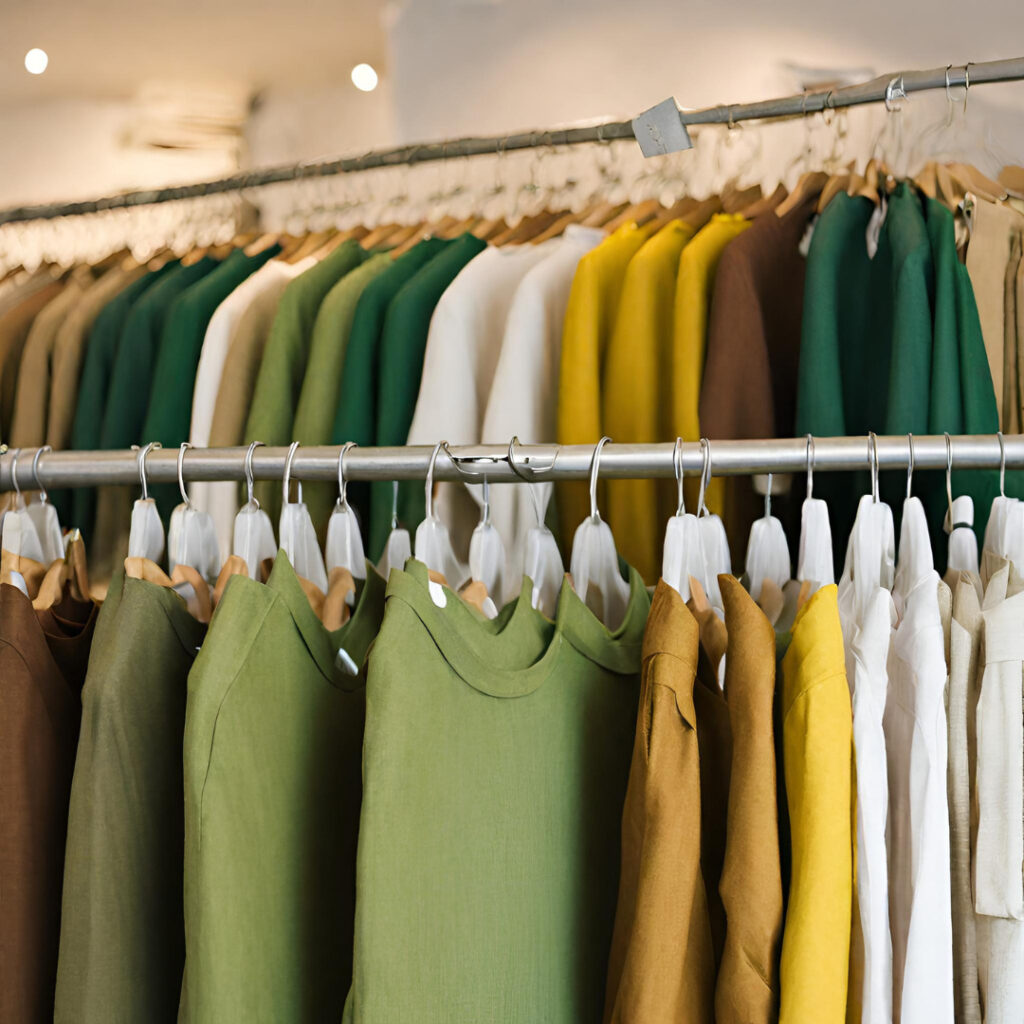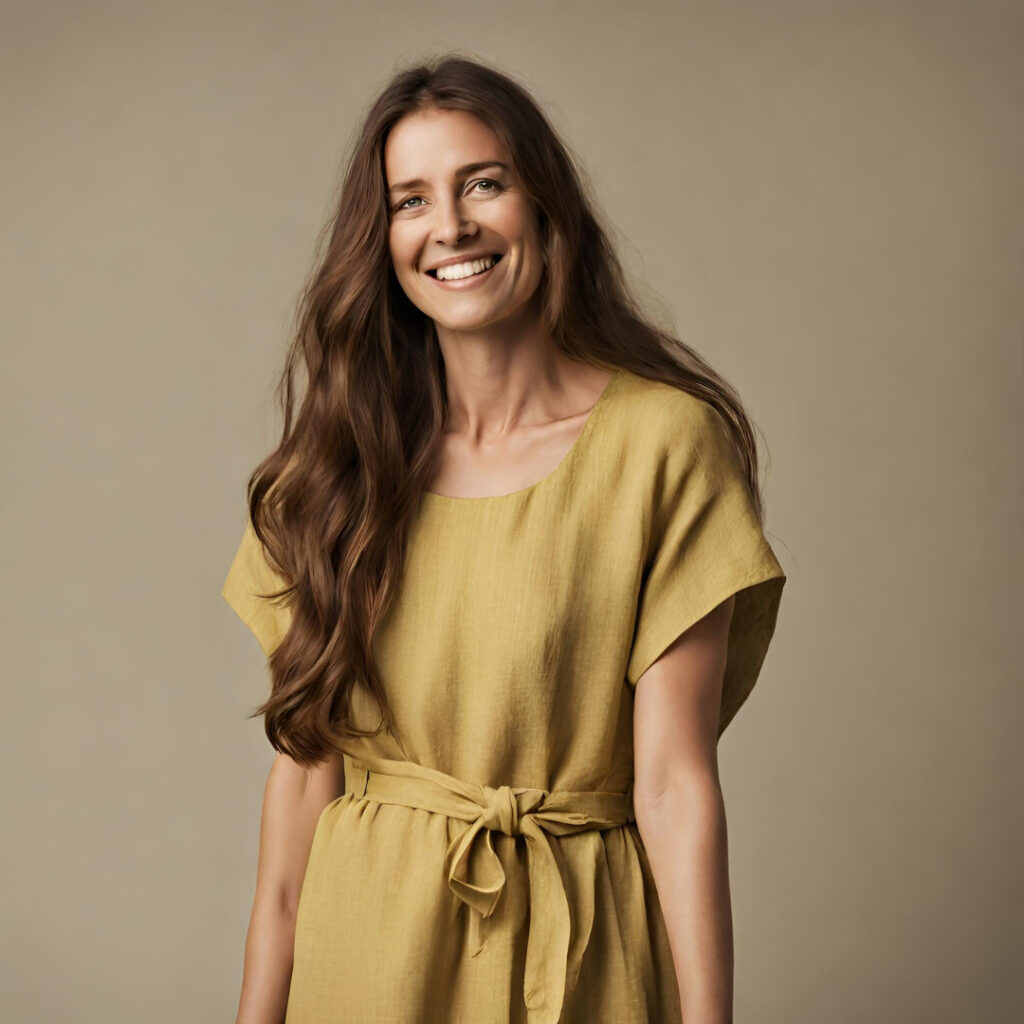In the quest for the perfect wardrobe, our clothing choices extend beyond style and comfort. Together, let’s strive for holistic fashion.

Synthetic fabrics, often used because they are cheap and durable, contain dangers to both your health and the environment.
Therefore, understanding the toxins hiding in these materials is an important step in making choices that match a toxin-free lifestyle.
This journey looks at the hidden risks and benefits of natural fibres. Further, we suggest sustainable brands to consider and show the value of certifications in guiding us towards holistic fashion choices.
Holistic fashion is key to a Holistic Home
Understanding Synthetic Fabrics for holistic fashion
Opting for synthetic fabrics such as polyester, nylon, and acrylic might seem convenient and budget-friendly for clothing. Yet, these materials can affect both the environment and your personal health.
For example, polyester is essentially a type of plastic made from crude oil. The production of polyester involves the use of many chemical processes that can lead to environmental pollution and resource depletion. Additionally, these synthetic fabrics are damaging to your own wellbeing.
Taking steps to take care of yourself and the environment can be as easy as choosing clothes made from natural materials. These clothes are comfy, long-lasting, and don’t come with the health risks that synthetic fabrics have.
Potential Toxins Lurking in Synthetics:
Synthetic fabrics might seem convenient, but they often hide potential harm for those who wear them. Many of these concerns arise from the release of harmful substances from the fabrics into the air. A further issue includes the absorption of these substances by the skin during everyday use.
Here’s a breakdown of some of these harmful substances and a guide on how to know if they are hiding in your clothes.
Phthalates
Phthalates are commonly used in synthetic materials. They mess with your hormones and cause health issues over time.
Brands often use them in plastic and vinyl items, including some clothes. They’re added to make the clothing more water-resistant, flexible, or durable.
Here are some types of clothing that may contain phthalates:
- Waterproof clothing such as raincoats, boots or other waterproof items.
- Synthetic or faux leather items, such as jackets, belts, or accessories.
- Plasticized accessories like handbags or hats
- Plastic-coated fabrics, such as in outerwear or protective clothing.
Do all clothes contain phthalates?
Not all clothing contains phthalates. There are regulations in some places that limit the use of phthalates due to health and environmental concerns. Additionally, many clothing brands are working to reduce or eliminate their use.
How do I find clothes without phthalates, because I strive for holistic fashion?
Staying informed and seeking transparency from clothing brands can help you make choices that match your values. Therefore, here are some tips to minimise phthalates in your clothes:
- Choose natural fibre clothing, such as cotton or linen.
- Check product labels for information.
- Look for products with certifications or labels showing that they are phthalate-free or made with minimal chemicals.

Formaldehyde
Formaldehyde can be released into the air and absorbed by your skin. As a result, longterm exposure to formaldehyde can lead to skin problems, breathing issues or allergic reactions.
It is used in many types of clothing and fabrics, especially those treated with wrinkle-resistant finishes or permanent-press treatments.
Here are some types of clothing where formaldehyde may be present: (hint, it’s not in holistic fashion items)
- Clothing becomes wrinkle-resistant because brands use formaldehyde to get a smooth look and reduce the need for ironing.
- Formaldehyde can be used in the dyeing and printing processes of fabrics. It helps to prevent fading and to securely fix prints so watch out in particular for vibrant colours and detailed patterns.
- Fabrics labeled as “permanent-press” or “easy-care” may contain formaldehyde to help the fabric retain its shape and resist wrinkles.
- Brands may treat some synthetic fabrics, like polyester, nylon, and acrylic, with formaldehyde-based finishes to enhance their properties.
- Blended fabrics that combine natural and synthetic fibres may also contain formaldehyde if the synthetic portion is treated.
Does all clothing contain Formaldehyde?
It’s important to note that not all clothing contains formaldehyde. Many brands are moving towards producing clothes with less harmful chemicals. Furthermore, some clothing brands share information about their production processes. Certifications like OEKO-TEX Standard 100 can show that they have tested for harmful substances.
How do I find clothes without Formaldehyde?
Are you worried about formaldehyde or other harmful chemicals in clothing? If so, consider choosing natural fibres like organic cotton, linen, or bamboo. Further, check product labels for information. Washing new clothes before wearing them can also help reduce chemicals.
Flame Retardants
To make synthetic fabrics flame resist, brands add flame retardants. This is often because of safety rules. Therefore, these fabrics are often used in items made for environments with a higher likelihood of fires.
Even though they are often added as a requirement, these chemicals are a concern for both the environment and your health. They may build up in the environment and mess with your hormones, affecting your thyroid and reproductive health.
Here are some types of clothing and other items that likely contain flame retardants:
- Children’s sleepwear to reduce the risk of fire-related injuries.
- Clothing worn in professions where there is a higher risk of exposure to flames or fire. such as firefighters.
- Some outdoor clothing, such as for activities like camping or hiking.
- Protective clothing used in industries where workers are exposed to fire or flammable materials may be treated with flame retardants, such as research labs.
- Fabrics used in mattresses and bedding. For example, mattress covers.
- Upholstered furniture, such as sofas and chairs.
Does all clothing contain flame retardants?
No, not all clothing contains flame retardants. Consequently, the use of flame retardants in clothes depends a lot on the purpose of the clothing, safety standards, and regulations.
Everyday clothing, such as casual and fashion items, typically don’t contain flame retardants unless there are specific safety standards on a type of clothing.
Further, clothing made from natural fibres, especially wool, are less likely to contain flame retardants. These materials are naturally flame-resistant, to varying extents.
Regulations and awareness about the use of flame retardants in clothing have led to changes. Some brands are moving toward making clothes without flame retardants due to environmental and health concerns.
How do I find clothes without flame retardants?
If you prefer clothing without flame retardants, you should
- Check product labels.
- Inquire with the brand.
- Look for clothes marketed as flame-retardant-free or made with reduced chemical content.
Keep in mind that safety standards may still apply to some types of clothing, mostly those for specific purposes or age groups.
“What you do makes a difference, and you have to decide what kind of difference you want to make.”
Jane Goodall
Embrace Holistic Fashion by choosing Natural Fibres:
As you start living a toxin-free life, what you wear can make a big difference. Holistic fashion is a small but powerful step toward staying healthy and making the world better.
Embrace the “Plant and Pause” philosophy of holistic fashion, because your clothes play a big part in how you feel. So, choose clothes made from things like organic cotton, linen, hemp, or bamboo. These options not only feel nice on your skin but also help the environment. As a result, choosing natural fabrics over synthetic ones helps reduce possible health risks and creates a healthier link between your body and the environment.
Holistic fashion isn’t ‘all or nothing’
While it’s great to aim for natural fabrics, let’s also be practical. For instance, changing your whole wardrobe overnight can be overwhelming. Thankfully, you don’t need to.
Think about the clothes you wear a lot or for a long time. Switch those first.
Clothing, especially intimate wear, can have prolonged contact with the skin. This increases the potential for chemical absorption. Therefore, start by choosing natural fibers for everyday clothes, such as cotton or bamboo. This simple choice is good for your wellbeing. As a result of this simple switch, you lowers how often you touch synthetic fabrics. This reduces the chance of chemicals getting into your body.

Why are natural fibres better for holistic fashion?
When it comes to mindful clothing, choosing organic and natural fibers is a key decision. This choice not only changes how you feel in your clothes but also makes a big difference in helping the environment and keeping you well.
Further, picking clothes made from organic and natural materials often goes hand in hand with fair and ethical labor practices. Brands that care about sustainability and social responsibility are often open about where their clothes come from and how they are made. This means workers are more likely to get fair pay and work in safe conditions.
Here are some go-to natural fibres to look out for:
Cotton for holistic fashion:
Choosing organic cotton is a great way to be kind to the environment and support fair practices. Further, it’s grown without synthetic pesticides or genetically modified seeds. This is good for the soil and the earth.
Natural fibres like cotton are gentle on the skin and let your skin breathe. Therefore, reducing the chances of irritation or allergies. This choice brings comfort and overall well-being.
Linen for holistic fashion:
Linen is a health-conscious fashion choice. With minimal production chemicals, it’s gentle on the skin and supports overall wellbeing. This fabric keeps you cool, which makes it great for warm weather. Opting for linen reflects a conscious decision for minimal environmental impact and maximum health benefits.
Hemp for holistic fashion:
Hemp needs very little water and pesticides to grow. You can use it for lots of different clothes, and growing it even helps keep the soil healthy. So, picking hemp is not just good for your clothes but also for the environment. It’s a smart and eco-friendly option!
Bamboo for holistic fashion:
Bamboo fabric is soft and keeps you comfy all day. It grows fast and needs little water and chemicals. Therefore, it’s great fabric. For holistic fashion. It’s breathable and works well at keeping you dry.
But, be mindful of how it’s processed as some brands still use chemicals when working with bamboo. however, more brands are choosing green options, and bamboo clothes are generally a cool pick for a sustainable wardrobe.

Go-to holistic fashion brands
If you’d like to start your holistic fashion wardrobe, or simply looking for ideas, here are some go-to brands for you to check out. They are generally known for their sustainable and toxin-free initiatives.
Eileen Fisher
Eileen Fisher is all about being kind to the planet. They use sustainable materials and treat workers fairly. Plus, with their take-back program, you can recycle your old Eileen Fisher clothes, closing the loop on sustainable fashion.
Their style is known for being simple, timeless, and versatile. They make clothes that are not just fashionable but also good for the environment and the people who make them.
This brand is good for women’s clothing, from petite through to plus size. Further, they also have a range of shoes and accessories.
Reformation
Reformation’s clothes are cool, stylish, and good for the Earth. They make trendy and sustainable outfits using eco-friendly materials and ethical practices.
This brand has great women’s clothes whether you are shopping for everyday wear or special occasions, such as weddings or parties. They also have shoes and bags to choose from.
Thought Clothing
Thought Clothing is all about using fabrics like organic cotton, hemp, and bamboo. They are known for creating a style that is comfortable, laid-back, and versatile. This makes it easy to mix and match their pieces. They commit to being fair to the planet and the people who make their clothes.
This brand is great for women’s clothing, from comfy casuals to activewear and cozy loungewear. Plus, they’ve got socks for the whole family, adding a touch of fun to your style game!
People Tree
People Tree is a leader in fair trade and sustainable fashion. Their clothes are comfy, classic, and inspired by many cultures. They use organic cotton to make ethical and eco-friendly clothing that’s good for you and the planet.
Perfect for women’s clothing, from casual to dressy, activewear, underwear and nightwear. Plus, discover a lovely selection of jewellery to complete your look.
Amour Vert
Amour Vert is all about sustainable fashion, using eco-friendly fabrics. They make stylish clothes with a timeless and versatile look, and they also try not to waste anything in their design and making.
This brand is great for women’s clothing and accessories, including bags, wallets, jewellery, beanies, scarves, and shoes.
Outerknown
Founded by surfer Kelly Slater, Outerknown is all about sustainable and ethically made clothing. Their style is laid-back with coastal vibes. They offer a range of comfortable and timeless pieces. Using organic cotton, recycled materials, and fair labor practices, they bring you holistic fashion.
This brand is great for both men’s and women’s clothing. They create regular clothes, jumpsuits, cozy sweaters, and jackets.
Pact
Pact specialises in creating stylish and sustainable clothing with a focus on organic cotton.
Committed to ethical creation, their style is known for being simple, versatile, and perfect for everyday wear. From comfy basics to activewear and loungewear, Pact offers a range of fashion that not only looks good but also feels good for the planet.
This brand is excellent for men’s and women’s clothing. Further, they offer towels, bedding, and sustainable gift ideas.
Veja
Veja is a cool sustainable sneaker brand. They use eco-friendly materials and make sneakers in a way that’s fair to people and the planet. Further, their style is trendy, and they’re open about where they get their stuff, being transparent about their supply chain.
This brand offers a great selection of sneakers and related accessories for men, women, and kids.
PrAna
PrAna combines sustainability and style in their activewear and casual clothing. Their fashion is trendy and eco-friendly, using organic cotton and recycled materials. With a commitment to fair trade, prAna ensures that your stylish choices also contribute to a more sustainable and ethical fashion landscape.
This brand is great for both men’s and women’s clothing and accessories. Also, they have yoga mats, hats, headbands, scarves, and chalk bags.
Kowtow
Kowtow is a brand from New Zealand and are popular in Australia. They make clothes that are organic, fair trade, and ethical. Their style is all about simple and modern designs, giving you a timeless and eco-friendly wardrobe.
Perfect for women’s clothing and accessories. Also, they sell hats, footwear, bags, jewellery, scrunchies, and more. Plus, they’ve got a small range for men too.
Spell
Spell, a famous Aussie brand, is all about boho-inspired and sustainable clothes. They have a cool, laid-back style with unique designs. Using eco-friendly materials like organic cotton, they make sure their production is ethical. So, not only do their clothes look good, but they also match values of sustainability and conscious fashion choices.
Spell is a good choice for women’s clothing and accessories. From sarongs, jewelry, and bags to headwear, belts, eyewear, and footwear, they’ve got you covered. Plus, they offer homewares and picnic blankets, bringing style to every part of your life.
Bhumi
Bhumi, an Aussie brand, creates comfy clothes from organic cotton. Their style is all about basics and activewear. They blend comfort with sustainable and fair practices. Certified organic and Fair Trade, they’re committed to doing things right while keeping you stylish and comfortable.
Great for men’s, women’s, and kids’ clothing. They have a main focus on underwear, loungewear, sleepwear, robes, and knitwear. Plus, they have a fantastic collection of bedding, towels, bath mats, and throws.
Nobody Denim
Nobody Denim, an Aussie brand, is all about sustainable denim. They use eco-friendly materials and ethical practices. Their style is modern and trendy, offering cool designs with a focus on being eco-conscious.
This brand is great for men’s and women’s jeans. For women, they also offer a good range of other denim clothing options. They add trendy and sustainable choices to your wardrobe.
Arnsdorf
Now, let’s talk about Arnsdorf, an Australian brand committed to sustainable and ethical fashion. Their style is modern and chic, with a focus on using organic and eco-friendly materials while been transparent in their production process.
This brand is great for women’s clothing, offering a stylish and modern flair.
Boody
Boody, an Australian brand, creates comfy and sustainable clothing using bamboo. Their style is all about modern basics and activewear. They look good and make you feel good about your holistic fashion choices.
This brand is good for men’s, women’s, and babies’ clothing needs. They stand out with a collection of undergarments, such as bras and period underwear.
KitX
KitX is another Australian brand about sustainable and ethical practices. Their style is modern and chic. They, use organic and natural fibres in their clothing creations. KitX doesn’t just offer fashion, they provide a conscious and stylish choice for those who value both looks and ethical fashion.
KitX is your go-to for women’s clothing and accessories with a stylish edge. Their modern and chic designs adds something extra to your wardrobe.
Tluxe
Tluxe, an Australian brand, is renowned for its sustainable and timeless fashion. Their style is all about classic elegance. They use eco-friendly fabrics and ethical production processes to create clothing that stands the test of time.
Ideal for women’s clothing with an added touch of luxury.
Pure Pod
Pure Pod, an Aussie brand, makes sustainable and organic clothes. Their style blends eco with modern fashion. Further, they are about ethical practices and transparency.
Great for women’s clothing. Further, Pure Pod also offers great gift ideas like lip balm, bath soaks, and scrunchies, adding a fun touch to your shopping experience.
Be mindful when striving for holistic fashion
To get the most accurate information on certifications, visit the brands’ official websites or contact them directly. Practices can change, and brands may update their information.
“Your clothing is a vote for the kind of world you want. Vote wisely—choose health, choose sustainability.”

How can I be sure I’m buying for holistic fashion?
As you try to live greener, go for clothes made from organic and natural materials. It’s a smart choice to match your clothes with what matters to you, such as taking care of yourself, the environment, and supporting holistic fashion.
Many certifications focus on regulating chemical use in clothing processes, or the use of organic and natural fibres. There are many, but here are are just a couple to look for:
OEKO-TEX Standard 100:
The OEKO-TEX Standard 100 certification is like a safety guarantee for textiles and clothes. It sets strict limits on the use of harmful substances. When a product has this certification, it means the item is checked to make sure it doesn’t have harmful levels of chemicals. It’s a way of making sure what you wear is safe and good for you.
Global Organic Textile Standard (GOTS):
GOTs is like a gold standard for eco-friendly and socially responsible production. It sets strict rules for how chemicals can be used when making clothes. Beyond that, it insists on fair labor practices, making sure the people making the clothes are treated well and paid fairly. So, when you see a product with the GOTS label, it means that your clothing is not only organic but also made in a way that cares for both the environment and the people involved in the process.
Certification is a choice
Remember, even though certifications like these are known worldwide, not all brands use them. Some are more common in certain areas. Further, if you want to know more information, it’s best to check their official websites, which are linked above. This will keep you updated about where and how these certifications are used globally.
Conclusion: Choose Holistic Fashion
Your clothing choices reflect your commitment to wellbeing, sustainability, and ethical fashion. It’s holistic fashion. Also, going toxin-free isn’t something you do alone, it’s an effort for a healthier planet and we all have a part to play.
When you shop, look for brands using natural fabrics and ones with certifications like GOTS and OEKO-TEX Standard 100. This tells you they’re open about what they do, and they care about the environment.
In the fashion world, every choice matters. Choose natural fibres, use fewer synthetics, and think “holistic fashion” for your closet. Our choices create change. So, help us to write a story of a toxin-free, eco-friendly, and socially responsible tomorrow.
Join the movement, one piece of clothing at a time, and let our combined choices rewrite the fashion story for future generations. We hold the threads of change. Let’s create a future we’re proud to wear.
‘Let your fashion choices be a reflection of your values—sustainable, ethical, and an advocate for a cleaner, healthier world“

